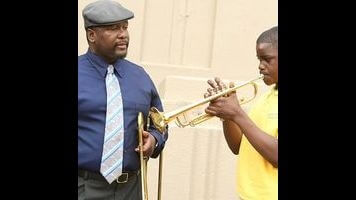Treme: “The Greatest Love”

Looked at one way, Davis’ proposed Katrina-themed R&B opera is just an excuse for Treme to feature a parade of overlooked New Orleans music legends from Clarence “Frogman” Henry to Al “Carnival Time” Johnson. Cameos from musicians have been a part of the series from the start, and Davis’ quest gives the show license to visit anyone it wishes as part of the story. But it’s doing more than that. The music of Henry, Johnson and, this week, James “Sugar Boy” Crawford, has become as much a part of the city as its most-famous sites, but the artists behind the music have faded deep into the background. It fits into a larger theme the show’s explored from the beginning, but particularly in this season, regarding the way New Orleans loves its past but doesn’t always preserve it. One day a building is home to J&M Records, the next you can do your laundry there. It connects, too, to the ways the city uses culture to sell itself while often exploiting those who create the culture in the first place, a theme I suspect will emerge the more time Delmond spends with those who would build a jazz center that respects and “monetizes” the culture and the more Albert comes to depend on his status as a “culture bearer” to receive care.
But back, for the moment, to Crawford. Released in 1953, “Jock-A-Mo” was Crawford’s biggest hit, and has since become synonymous with New Orleans, both via Crawford’s version and the versions made famous by The Dixie Cups, Dr. John and other under the title “Iko Iko.” It’s a couple of Mardi Gras Indian chants that Crawford strung together without really knowing what they meant, but it gave him a career, even if, as he claimed, he never received any money from the song. It also gave New Orleans one of its theme songs.
Then, in 1963, Crawford was the victim of the police beating he references here, forcing a long recovery that effectively ended his music career and led him to give up secular music. It’s no wonder that Davis, who recognizes everyone, didn’t recognize him at the recording session for his grandson, Davell Crawford. Once he does, he knows he’s witness to something rare: Sugar Boy singing again. And so are we. Crawford died on Septemeber 15th of this year, just a few months after performing at the 2012 New Orleans Jazz Festival. (I’m not sure when this episode was filmed.) Even if it didn’t serve the show around it, this season’s Davis’ plot is practically a public service, dragging back into the spotlight, if only for a few minutes, artists who haven’t been seen in a while before they disappear for good.
It does serve the bigger picture, however, this week especially, where Crawford’s story of police brutality connects with LP’s investigation and Toni’s attempt to bring down Wilson, the bad cop to end all bad cops. Their storylines converge in a home-cooked meal at Toni’s house followed by a trip to see a performance of Waiting For Godot drawing from the Katrina experience and staged among the ruins. (That production is by Paul Chan and one of the actors who starred in it was Treme’s own Wendell Pierce.) It also gives the episode, and the show, one of its most moving moments when Toni breaks down while watching. Godot, like Treme, is a piece about hope in the face of despair. By Samuel Beckett’s reckoning—at least how I’ve always read the play—it’s a hope that’s both foolish and necessary. But reading a play and seeing it staged, as Sofia later points out, are two different experiences entirely. And here are flesh-and-blood survivors dressed like contemporary Katrina survivors waiting to be rescued by Godot even as they start to think, as Toni’s fellow audience member points out, “Motherfucker ain’t comin’.” He may be right. And, within the text of the play itself, he is right. But I don’t think it’s despair that’s overwhelming Toni in that moment so much as recognition. She sees herself, to borrow a line from a different Beckett work, in characters who can’t go on and yet go on.








































